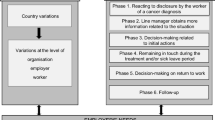Abstract
In 2017, there will be more than 250,000 new diagnoses of invasive breast cancer; most cases will occur in working-age women. The goal of this qualitative study was to explore low-wage-earning breast cancer survivors’ experiences communicating with their oncology team about cancer and employment issues. Twenty-four low-wage-earning breast cancer survivors in the USA were interviewed in 2012 using a structured interview protocol. Sociodemographic data, cancer history, and patient-provider communication experiences regarding the management of cancer and work were collected. Interviews were analyzed using grounded theory strategy of constant comparative analysis. Low-wage-earning breast cancer survivors’ experiences communicating with their oncology team about employment and cancer focused on three dimensions of patient-provider communication: extent, quality, and content. Over 70% of respondents reported no communication or only routine communication with their providers regarding work; three quarters of women reported poor or standard communication quality, and content of work-related communication covered scheduling issues, work absences, continuing to work during treatment, and financial concerns. Communication between oncology care teams and low-wage-earning cancer patients is critical to the successful management of treatment and work responsibilities given the vulnerable employment situation of these women. There is a need for education of oncology team members about how cancer and its treatment can impact employment for all workers, but especially for low-wage workers, thereby allowing the care team to address these issues proactively and help patients successfully manage both cancer treatment and work responsibilities.
Similar content being viewed by others
Notes
According to the social-inclusion definition of low-wage [6], low-wage jobs are those that pay less than two thirds of the median wage for men. The median wage for men in KY was approximately $14.50 per hour in 2012 [19]. We rounded this number up to $15.00 per hour for the ease of recruitment and our definition of low-wage is also comparable to 135% of the US poverty line for a family of four in 2012, when this study was conducted.
References
American Cancer Society (2017) Breast cancer facts and figures 2017–2018. American Cancer Society, Inc, Atlanta
American Cancer Society (2016) Cancer treatment and survivorship facts and figures 2016–2017. American Cancer Society, Inc, Atlanta
Siegel R, Desantis C, Virgo K, Stein K, Mariotto A, Smith T et al (2012) Cancer treatment and survivorship statistics, 2012. CA Cancer J Clin 62(4):220–241
Bouknight RR, Bradley CJ, Luo Z (2006) Correlates of return to work for breast cancer survivors. J Clin Oncol 24(3):345–353
Nitkin P, Parkinson M, Schultz IZ (2011) Cancer and work: a Canadian perspective. University of British Columiba and British Columbia Cancer Agency, Vancouver, B.C. https://www.capo.ca/pdf/CancerandWork-ACanadianPerspective.pdf. Accessed 21 Feb 2018
Boushey H, Fremstad S, Gregg S, Waller M (2007) Understanding low-wage work in the United States. The Mobility Agenda, Washington, D. C
Watson E, Swanberg JE (2011) Flexible workplace solutions for low-wage hourly workers: a framework for a national conversation. Labor Employ Law Forum 3(3):380–437
Vanderpool RC, Swanberg JE, Chambers MD (2013) A narrative review of the confluence of breast cancer and low-wage employment and its impact on receipt of guideline-recommended treatment. Glob Adv Heal Med 2(5):75–85
Schmitt J (2012) Low-wage lessons. Center for Economic and Policy Research, Washington, D.C. http://cepr.net/documents/publications/low-wage-2012-01.pdf. Accessed 21 Feb 2018
Watson L, Frohlich L, Johnston E (2014) Collateral damage: scheduling challenges for workers in low-wage jobs and their consequences. National Women’s Law Center, Washington, D. C
Kamau C (2015) Preparing patients with cancer who work and treatment responsiveness. BMJ Support Palliat Care 7(1):94–97
Bowling A (1995) What things are important in people’s lives? A survey of the public’s judgments to inform scales of health related quality of life. Soc Sci Med 41:1447–1462
Meyer T, Mark M (1995) Effects of psychosocial interventions with adult cancer patients: a meta-analysis of randomized experiments. Health Psychol 14:101–108
Amir Z, Neary D, Luker K (2008) Cancer survivors’ views of work 3 years post diagnosis: a UK perspective. Eur J Oncol Nurs 12(3):190–197
Maunsell E, Brisson C, Dubois L, Lauzier S, Fraser A (1999) Work problems after breast cancer: an exploratory qualitative study. Psychooncology 8(6):467–473
Bains M, Yarker J, Amir Z, Wynn P, Munir F (2012) Helping cancer survivors return to work: what providers tell us about the challenges in assisting cancer patients with work questions. J Occup Rehabil 22(1):71–77
Verlinde E, De Laender N, De Maesschalck S, Deveugele M, Willems S (2012) The social gradient in doctor-patient communication. Int J Equity Health 11(1):12
Swanberg JE, Nichols HM, Ko J, Vanderpool RC (2017) Managing cancer and employment: decisions and strategies used by breast cancer survivors employed in low-wage jobs. J Psychosoc Oncol 35(2):180–201
Bureau of Labor Statistics (2012) Weekly earnings of full-time workers by age and sex, second quarter 2012. www.bls.gov/opub/ted/2012/ted_20120720.htm. Accessed 1 January 2016
Taylor BJ, Kermode S, Robert KL (2006) Research in nursing and health care: creating evidence for practice, 3rd edn. Australia, Thomas Nelson Australia
Corbin J, Strauss A (2008) Basics of qualitative research, 3rd edn. Sage, Thousand Oaks
Dowsett SM, Saul JL, Butow PN, Dunn SM, Boyer MJ, Findlow R, Dunsmore J (2000) Communication styles in the cancer consultation: preferences for a patient-centred approach. Psychooncology 9(2):147–156
Swanberg JE, Watson E, Eastman M (2014) Scheduling challenges among workers in low-wage hourly jobs: similarities and differences among workers in standard- and nonstandard-hour jobs. Commun Work Fam 17(4):409–435
Stewart M (2001) Towards a global definition of patient centred care. The patient should be the judge of patient centred care. BMJ 322:444–445
Frazier LM, Miller VA, Miller BE, Horbelt DV, Delmore JE, Ahlers-Schmidt CR (2009) Cancer-related tasks involving employment: opportunities for clincal assistance. J Support Oncol 7(6):229–236
Author information
Authors and Affiliations
Corresponding author
Rights and permissions
About this article
Cite this article
Nichols, H.M., Swanberg, J.E. & Vanderpool, R.C. Patient-Provider Communication: Experiences of Low-Wage-Earning Breast Cancer Survivors in Managing Cancer and Work. J Canc Educ 34, 542–549 (2019). https://doi.org/10.1007/s13187-018-1338-4
Published:
Issue Date:
DOI: https://doi.org/10.1007/s13187-018-1338-4




